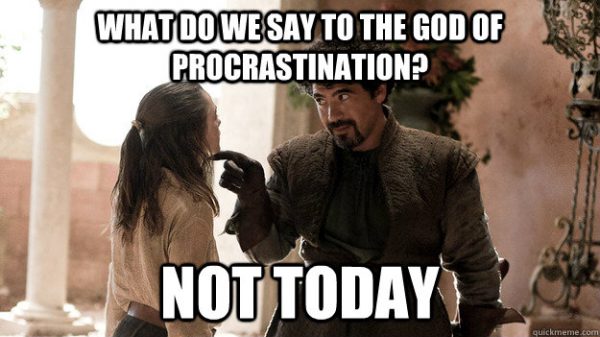
April 10, 2018, by Anjni
Procrastination: Is It Really THAT Bad
So we’re well into April now, and the Easter holidays are already half over for every UoN student out there (I’m still in classes over here, but I’ll shed a tear for you anyway), which means exams are drawing ever nearer. And whilst you may have indulged and given yourself a bit of a break and taken it easy for the first half (which, as I’ve said before, is vital and totally, TOTALLY needed after a whole term’s worth of hard work!) it’s time to get crackin’ on that pile of work once more. Uni doesn’t start for another two weeks so there’s still time for us students to get our act together, knuckle down and get through it all. But of course, procrastination – more often than not – has other plans for us. And it’s something you hear about all the time; whether this be through books, online – via UoN blog posts (hehe) – everywhere we turn, we seem to be bombarded with a bunch of tips and tricks concerning the parasite that is procrastination. Things like “why do we procrastinate”, “top ten procrastination clichés and how to overcome them” and “why you should avoid procrastination like the plague” can be extremely handy in helping us understand and get over (or simply just delay) the process of procrastination. But it seems that procrastination is continuously painted in a negative light; as something that needs to be overcome, battled – eliminated even. And I’m here to tell you that, whilst it would be nice to eradicate it completely (it would be a great help in getting me through all this uni work, I tell you) it’s not necessarily realistic, so we may just have to settle for finding ways to reduce it. Or – even better – we could find ways for it to *gasp* work for US! (Yes, it’s possible, trust me!)
Procrastination as a Form of Prioritisation/Time Management
Whilst procrastination can sometimes serve to get in the way of completing your work or meeting deadlines, it can actually be used to help us achieve tasks and tick some items off of our list! Paradoxical as it may seem, we can actually use our unwillingness and avoidance of one task to help us achieve another. In establishing a hierarchy of the tasks you have to do, most to least urgent, and throwing together a short list will give you a visual representation of everything that needs doing, from now right up until the start of summer for instance. Of course there should be some sort of system in place, you shouldn’t be planning for next summer when this summer hasn’t even rolled around yet, but any research or planning that needs doing for other aspects of your life can be done during those ‘nul’ moments between (or before) intense study periods. For example, the time you spend avoiding revision can be used effectively in applying for internships, volunteering schemes or even planning out and organising your summer travels (the last of which I am still trying to do as end of term draws ever nearer this side of the globe).
With your natural tendency to procrastinate, you’ll find that you avoid items on your list by completing others, and in this way, you’ll actually find yourself becoming productive in the process. What happens here is that you put off one task to prioritise and accomplish another, and in this sense your so-called procrastination can actually serve as a tool for time-management as you work your way through your hierarchy of duties. And whilst less important tasks will – and should – be deferred to make room for more urgent ones, they will nonetheless be completed somewhere along the line and your to-do list will become progressively shorter.
Procrastination and Creativity
 If procrastination leads to creativity… well that makes most of us students true artists then.
If procrastination leads to creativity… well that makes most of us students true artists then.
Sometimes it’s actually desirable to put off a task so as to give yourself more time to mull things over. Taking a step back and sleeping on it can actually serve to produce a better, more useful solution/answer to your task at hand. Taking a moment out to do something different for a bit and letting your mind wander (letting yourself procrastinate, the term is procrastinate) can actually be advantageous, and you’ll often find that the answer will come to you far easier when you’re not consciously and continually focussed on it, and thus creativity can actually stem from this period of avoidance (period of procrastination). In fact, your brain needs to unplug from these conscious, high-focussing activities to relaxing, low focus ones so as to help you work through problems and reach a solution. So indulging in a bit of Netflix or losing yourself in a good book between tasks isn’t so bad. A little relaxation can actually help us formulate solutions and unleash our creativity through some much needed chill time, and it also gives us a break from it all; from all the tough decisions and the workload, and if you’ve read my last post, you’ll know how vital it is to take time out for yourself. Of course to keep this from getting out of hand, you should restrict yourself and still have some sort of deadline or timeframe by which to reach this decision and complete the task. Procrastination can be good for your creative juices, although best not to over-indulge your senses; if Netflix be the food of avoidance, play on (just don’t give me excess of it or surfeit my appetite).
Final Thoughts
Now I’m not in any way trying to promote poor working habits, and you shouldn’t take this post as an excuse to continue procrastinating (she says whilst she wills you to continue reading this thread). Procrastination can become downright destructive if we let it consume us to the point of devastation, and it’s important to be able to recognise the difference between inactive procrastination and active ways in which to utilise it to our advantage. Procrastination isn’t all bad, and it certainly doesn’t have to be the villain that we paint it to be. All I’m trying to say is that you needn’t beat yourself up about procrastinating every once in a while because it may actually serve to be advantageous at times. Both the devil and the angel, procrastination can be used to help us shape the structure of our tasks and their completion in such a way that things can – and will! – get done (eventually).
So let me know your thoughts in the comments below. And if you’re ever wondering what to say to the Lord of Procrastination next time he calls… well, you can tell him: NOT TODAY! Maybe tomorrow instead…?
No comments yet, fill out a comment to be the first


Leave a Reply